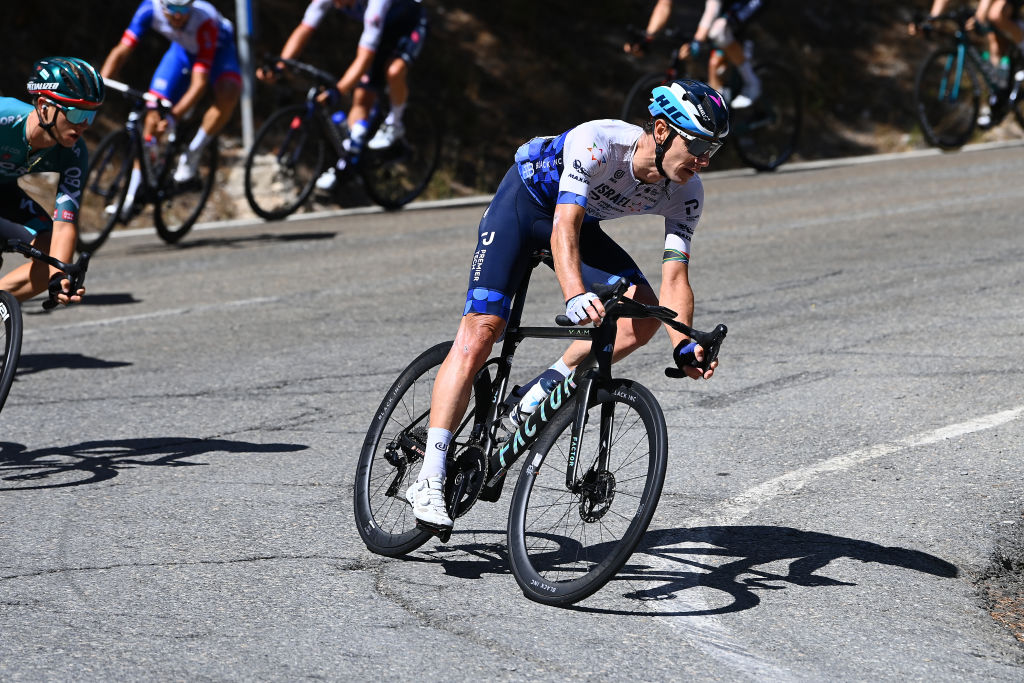'How do you justify no Tour de France to shareholders?' – Factor Bikes CEO speaks out on WorldTour relegation
Bike supplier to at-risk Israel-Premier Tech gives a sponsor's point of view on UCI's promotion-relegation system

The CEO of British bike brand Factor, Rob Gitelis, has spoken out in response to the ongoing WorldTour relegation battle.
Speaking exclusively to Cyclingnews, Gitelis described the current system as 'very half-baked', agreeing with EF Education-EasyPost manager Jonathan Vaughters' recent claim that it could spell the death of a team.
As the 2022 season nears its end, the impending cut-off for the UCI's three-year ranking system is drawing ever closer, and with it the prospect of two teams being relegated from the sport's top tier. While the UCI has suggested it is considering a reform, right now the system mandates that there will be only 18 teams in the WorldTour in 2023, despite 20 teams vying for a license for 2023-2025.
Gitelis' company, Factor Bikes, has been a sponsor of Israel-Premier Tech, one of the teams currently at risk of being relegated from cycling's top tier, since 2020. Their current contract finishes at the end of this season.
Relegation watch: Israel-Premier Tech drift further from safety
Sylvan Adams: WorldTour relegation is destructive to the sport
Exclusive: 2023 WorldTour could include 20 teams to avoid relegation chaos, legal battles
Vaughters: UCI WorldTour points system is promotion or death
UCI points system 'madness' and 'unfair' says Movistar boss
Despite much of the focus being around that 18th spot and a WorldTour license, Gitelis explained that for Factor - and for other sponsors too – the cut-off is not whether a team has a WorldTour license but an invitation to the Tour de France.
"There's relegation, and there's not being in the Tour de France," Gitelis explained. "Unfortunately, the Tour de France is so important to our industry.
"In almost all of the studies that are done, the value of the Tour de France is almost 50% of the whole year's value."
Get The Leadout Newsletter
The latest race content, interviews, features, reviews and expert buying guides, direct to your inbox!
In that respect, there is a potential safety net for relegated teams, with the top two non-WorldTour teams each year earning automatic wildcard entries to the Grand Tours, while the third-placed get invites to WorldTour one-day races such as Paris-Roubaix.
"We look at it as 'okay, you're not in the WorldTour, but you've gotten one of those two spots, which means you can ride all over the world for races'. To me, that's business as usual," Gitelis said.
"However, if you get relegated and you're in that third spot, which is the one where you get all the one-day WorldTour invites, but you're not invited to the Grand Tours, then all bets are off because the value of the sponsorship then changes quite a bit."
As it stands, Israel-Premier Tech are in that third spot. Lotto Soudal – the other WorldTour team currently in the relegation zone – and TotalEnergies are both above them in the 2022 ranking, so they would not be guaranteed a place at the Tour de France.
Who pays the bills?
Gitelis explains that for most teams, the bike sponsor would usually also represent the second largest cash injection for a team behind the title sponsor.
The difference, he says, between a good ProTeam and one that's not getting those wildcard invitations could be the entirety of that cash injection, a sum he puts in the region of three-quarters of a million Euros.
"You look at the difference in costs between what used to be called ProContinental [UCI ProTeam] and the WorldTour [UCI WorldTeam], it's an enormous difference," he said.
"We used to sponsor team Roompot. That was a ProConti team, they raced Paris-Roubaix and things like that. We gave them no cash, we gave them bikes, it was that inexpensive. I think for a very good ProTeam, maybe it's about €750,000."
Professional cycling is built upon the model of sponsorship and, naturally, the perceived value of a team will influence the size of sponsorship it can attract. This in turn has an impact on the team's financial security.
For a sponsor, a team fighting for relegation comes with its risks. A bad season could result in the team being dropped out of the WorldTour, or out of those Grand Tour invite spots, where the sponsor's exposure would be reduced. The risk of this happening, and the resulting drop in sponsorship value were it to happen, would undoubtedly affect how much money a brand would be willing to invest.
That would include the bike sponsor, the title sponsors and a multitude of other technical sponsors.
"[Return on investment] just becomes so much different [if a team is relegated]. It's the story of business, after all. And with sponsorship, you're looking at an ROI," Gitelis said.
"If you are not at the Tour de France, even if you're racing one-day races and things like that, ROI is just so much different. So you couldn't justify to your shareholders. Why are you paying WorldTour money and not being in the WorldTour? It's as simple as that."
Understandably, Gitelis was unwilling to divulge details of the negotiations between Factor and Israel-Premier Tech, but a result of the above, most sponsorship agreements include a clause allowing a sponsor to pull out in the event of relegation from the WorldTour.
That is just one of the consequences of relegation from the WorldTour.
Death of a team

Returning to the point made by Vaughters, Gitelis explained how relegation could result in the death of a team.
"Relegation is probably a good thing until it happens to you," he joked. "I think there needs to be a system, I just think the current system was very half-baked.
"We just finished a global pandemic," he continued, explaining the extenuating circumstances under which he believes the UCI should consider a rethink of the plan.
"Who would have thought at the start when I signed with Israel-Premier Tech, that we were going to go through a global pandemic?
"So I feel like there definitely needs to be some flexibility around at least the current situation and then I think it needs to be better thought through, how the relegation system would work, because it is a bit of a cliff.
"We've seen Jonathan Vaughters and Sylvan Adams have both said that. If you're in the WorldTour currently and you get relegated, that could potentially just mean death to the team.
"Because the riders' contracts are based on them being on a WorldTour team and sponsorship contracts are based on a WorldTour team. Riders could leave, sponsors could leave, and then if riders don't leave but sponsors do, those riders have contracts that still have to be paid. So it comes back to the team having to pay them and perhaps the funding is not there.
"I think that the intentions of the UCI were correct, but when you look at something like European football, there's revenue sharing and you're not relegated to death. And you're then incentivized to get back to that upper division.
"In European football, you can fall for four or five years, because there are several layers that you can fall through. In professional cycling, there's being at the Tour de France or not, and if you're not, then you're already in a rather desperate situation."

Josh is Associate Editor of Cyclingnews – leading our content on the best bikes, kit and the latest breaking tech stories from the pro peloton. He has been with us since the summer of 2019 and throughout that time he's covered everything from buyer's guides and deals to the latest tech news and reviews.
On the bike, Josh has been riding and racing for over 15 years. He started out racing cross country in his teens back when 26-inch wheels and triple chainsets were still mainstream, but he found favour in road racing in his early 20s, racing at a local and national level for Somerset-based Team Tor 2000. These days he rides indoors for convenience and fitness, and outdoors for fun on road, gravel, 'cross and cross-country bikes, the latter usually with his two dogs in tow.